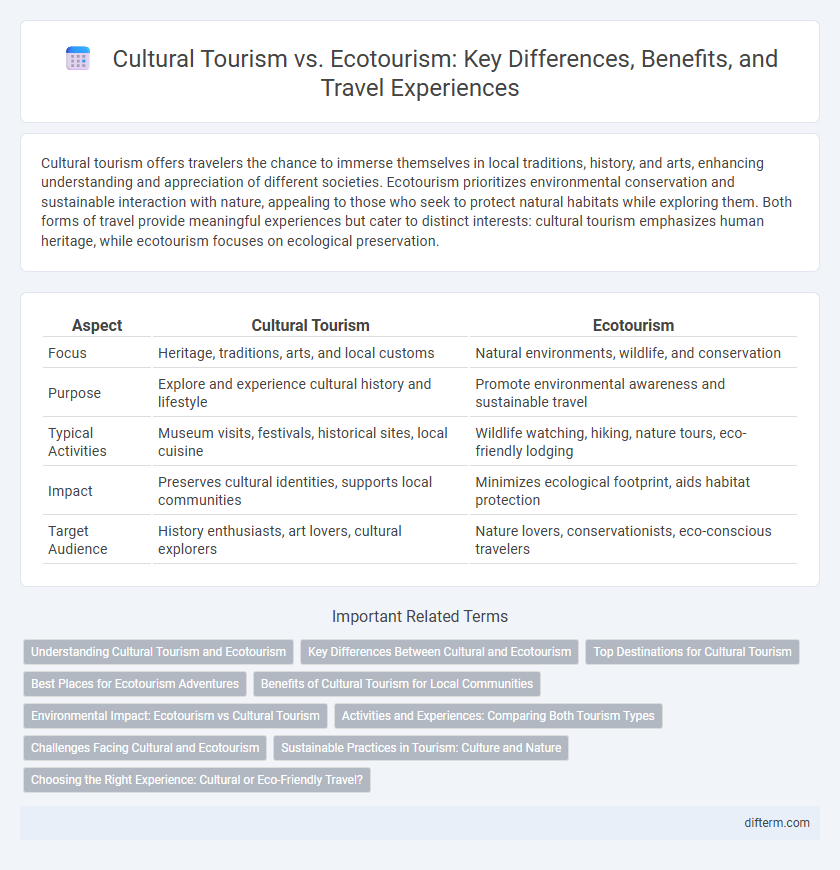Cultural tourism offers travelers the chance to immerse themselves in local traditions, history, and arts, enhancing understanding and appreciation of different societies. Ecotourism prioritizes environmental conservation and sustainable interaction with nature, appealing to those who seek to protect natural habitats while exploring them. Both forms of travel provide meaningful experiences but cater to distinct interests: cultural tourism emphasizes human heritage, while ecotourism focuses on ecological preservation.
Table of Comparison
| Aspect | Cultural Tourism | Ecotourism |
|---|---|---|
| Focus | Heritage, traditions, arts, and local customs | Natural environments, wildlife, and conservation |
| Purpose | Explore and experience cultural history and lifestyle | Promote environmental awareness and sustainable travel |
| Typical Activities | Museum visits, festivals, historical sites, local cuisine | Wildlife watching, hiking, nature tours, eco-friendly lodging |
| Impact | Preserves cultural identities, supports local communities | Minimizes ecological footprint, aids habitat protection |
| Target Audience | History enthusiasts, art lovers, cultural explorers | Nature lovers, conservationists, eco-conscious travelers |
Understanding Cultural Tourism and Ecotourism
Cultural tourism emphasizes exploring the heritage, traditions, and artistic expressions of a destination, offering immersive experiences in local customs and historical landmarks. Ecotourism prioritizes sustainable travel that conserves natural environments and supports the well-being of indigenous communities, promoting responsible interaction with wildlife and ecosystems. Both forms of tourism contribute to local economies while fostering awareness and respect for cultural and environmental preservation.
Key Differences Between Cultural and Ecotourism
Cultural tourism centers on exploring heritage, customs, and traditions of a destination, often involving visits to historical sites, museums, and festivals. Ecotourism emphasizes sustainable travel to natural areas, promoting conservation, biodiversity, and minimal environmental impact while supporting local communities. Key differences include the primary focus on human culture in cultural tourism versus environmental preservation and wildlife in ecotourism.
Top Destinations for Cultural Tourism
Top destinations for cultural tourism include cities like Kyoto, Rome, and Istanbul, renowned for their rich historical heritage, ancient architecture, and vibrant local traditions. Cultural tourism emphasizes immersive experiences in museums, galleries, historical sites, and festivals that showcase indigenous arts, cuisine, and customs. Travelers seeking deep cultural connections prioritize destinations with preserved landmarks and active cultural events that provide meaningful insights into the local way of life.
Best Places for Ecotourism Adventures
Costa Rica's Monteverde Cloud Forest and the Galapagos Islands in Ecuador offer unparalleled ecotourism adventures with rich biodiversity and sustainable travel practices. In contrast to cultural tourism's emphasis on heritage and traditions, these destinations provide immersive experiences in pristine natural environments, including wildlife observation and conservation activities. Travelers seeking ecotourism adventures prioritize locations like New Zealand's Fiordland National Park and Kenya's Maasai Mara for their commitment to environmental preservation and eco-friendly tourism infrastructure.
Benefits of Cultural Tourism for Local Communities
Cultural tourism promotes the preservation of local heritage by generating economic support for museums, artisans, and traditional performances, creating job opportunities and boosting small businesses. It encourages community pride and intergenerational knowledge transfer, strengthening social cohesion and reinforcing cultural identity. By attracting travelers interested in authentic experiences, cultural tourism helps diversify local economies while fostering sustainable development practices.
Environmental Impact: Ecotourism vs Cultural Tourism
Ecotourism prioritizes conservation and minimal environmental impact by promoting sustainable practices such as wildlife preservation, habitat restoration, and low-carbon travel options. Cultural tourism often involves larger-scale infrastructure and higher visitor density, which can lead to increased waste, resource consumption, and damage to heritage sites. Effective management in both sectors is crucial to balance visitor experiences with the protection of natural and cultural resources.
Activities and Experiences: Comparing Both Tourism Types
Cultural tourism offers immersive experiences such as visiting historical landmarks, attending traditional festivals, and exploring museums that showcase local heritage. Ecotourism emphasizes activities like wildlife watching, hiking in natural reserves, and participating in conservation projects that promote environmental sustainability. Both tourism types provide unique opportunities to connect with destinations, but cultural tourism centers on human history and customs, whereas ecotourism highlights nature and ecological preservation.
Challenges Facing Cultural and Ecotourism
Cultural tourism faces challenges such as over-commercialization, which can dilute authentic experiences and negatively impact local communities. Ecotourism encounters issues including environmental degradation caused by increased visitor traffic and inadequate infrastructure to manage natural resources sustainably. Both sectors must balance visitor demand with preserving cultural heritage and natural ecosystems to ensure long-term viability.
Sustainable Practices in Tourism: Culture and Nature
Sustainable tourism integrates cultural preservation and environmental conservation, promoting responsible travel that respects local traditions and natural habitats. Cultural tourism emphasizes safeguarding heritage sites, supporting indigenous communities, and maintaining intangible cultural values, while ecotourism prioritizes protecting biodiversity, minimizing ecological footprints, and fostering environmental education. Both approaches contribute to sustainable development by balancing economic benefits with the stewardship of cultural identity and natural resources.
Choosing the Right Experience: Cultural or Eco-Friendly Travel?
Selecting between cultural tourism and ecotourism depends on travelers' priorities: immersive exploration of local heritage and traditions versus sustainable engagement with natural environments. Cultural tourism offers unique access to museums, historical sites, and festivals, enriching understanding of diverse societies and artistic expressions. Ecotourism emphasizes conservation, wildlife observation, and minimizing environmental impact, catering to those seeking responsible travel experiences that support ecosystem preservation.
cultural tourism vs ecotourism Infographic

 difterm.com
difterm.com